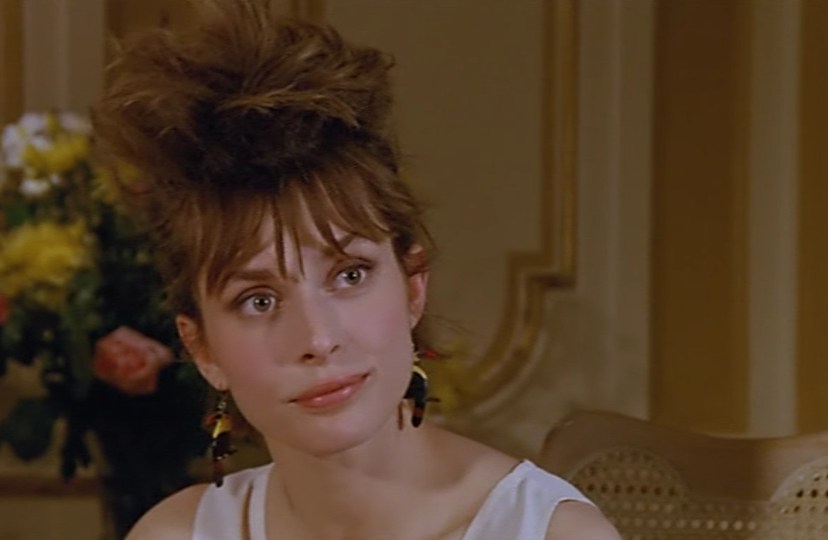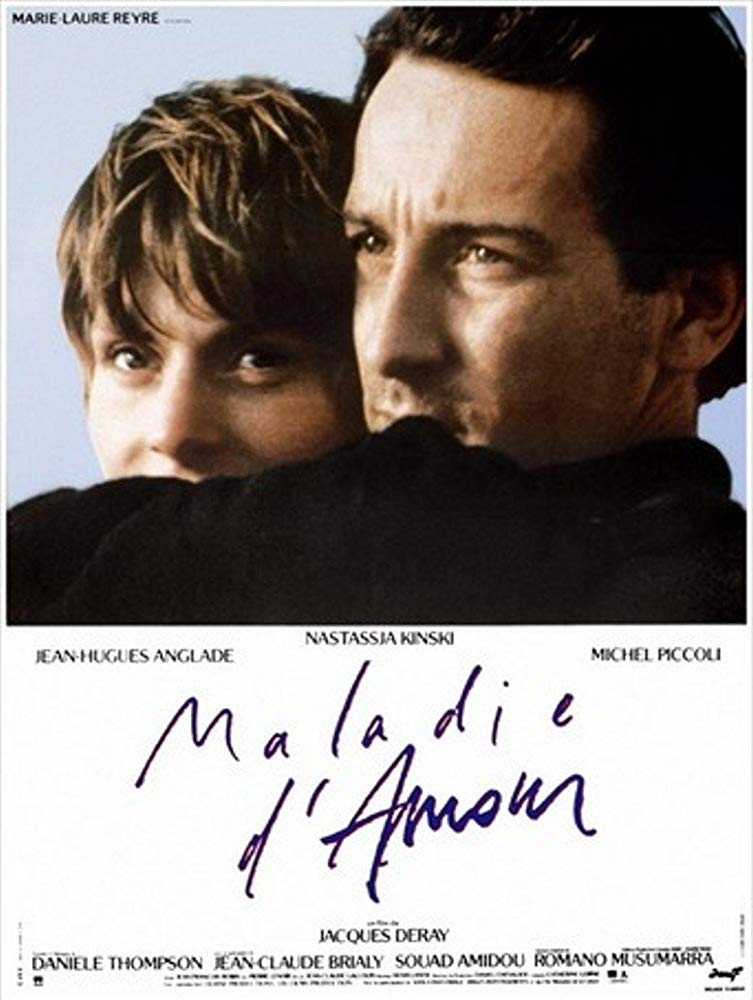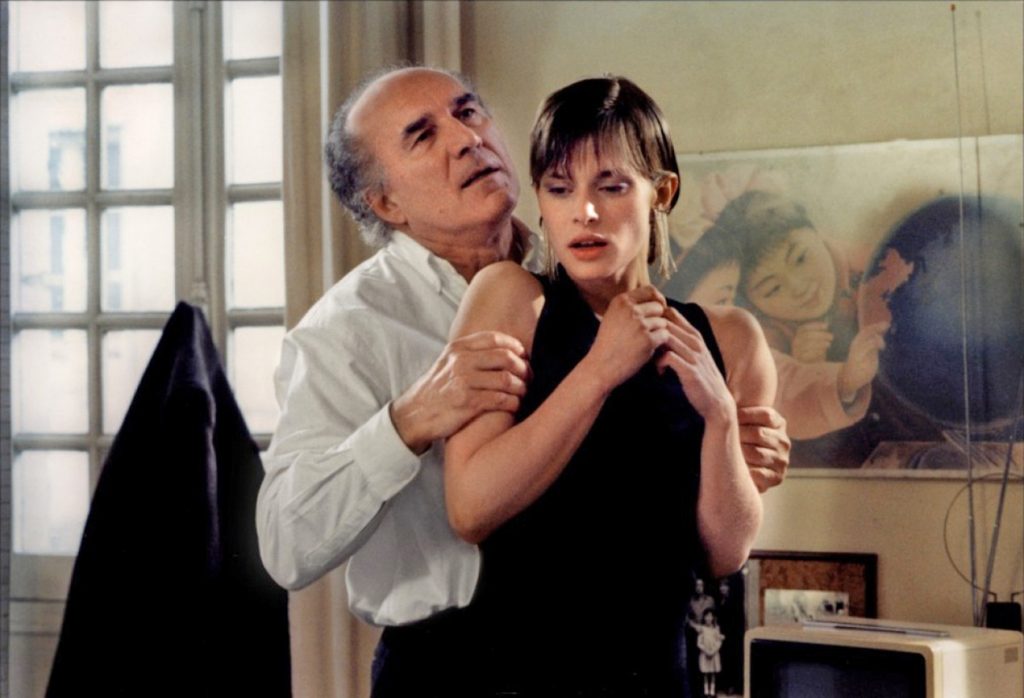Dir: Jacques Deray
Star: Nastassja Kinski, Jean-Hugues Anglade, Michel Piccoli, Jean-Claude Brialy
In which we learn, that everyone in France is a slut.
Okay, maybe that’s an exaggeration. But it sure seems like it here: in the love triangle between hairdresser Juliet (Kinski), and doctors Clément (Anglade) and Raoul (Bergeron), fidelity is low on the list of priorities for everyone. Clément has an “almost fiancée,” and Raoul is flat-out married: these existing relationships hardly appear to present the slightest impediment to either man getting involved with Juliet. Meanwhile, she bounces between the two of them like a elaborately coiffed shuttlecock (if, like me, you’d forgotten this was an eighties film, some of her hairstyles will quickly remind you; an example can be seen below), as her whims appear to dictate. It’s like she’s forever requiring a second opinion.

You can argue who has the prior claim. Clément is the first to see her, sharing a carriage and a “strangers on a train” moment on their way in to Bordeaux. But it’s Raoul who is the first to engage with her, being a customer at the salon where Juliet works. However, it isn’t long before the smarts gulf between a highly-respected oncologist and a hairdresser starts to prove problematic. When the pet dog he gives her dies (it belonged to a late patient of his), Raoul isn’t around to comfort her. Clément is, leading to a passionate session, word of which unfortunately, gets back to Raoul. He calls the subordinate doctor into his office and berates him about the deceased canine. “He had a first-class funeral. Two beautiful young undertakers. They fucked on his grave, then went to a hotel.”
Seeing his career evaporating in front of his eyes, Clément backpedals desperately, saying “That didn’t count. It was just playing around… It was nothing,” which counts as a bit of a dick move, I’d say. It is, however, orders of magnitude better than Raoul’s behavior: for he has been tape-recording the conversation, and rushes home to play it to Juliet. She’s not happy with his dismissal, needless to say, and breaks off their affair. However, a little further down the road, she makes up with Clément; he abandons his specialist’s position to avoid reprisals from Raoul, in favor of general practice in a small French town. For a brief while, they appear to be happy. But wouldn’t you know it? She gets bored of life as a provincial housewife, after he wants to have a child, and heads back to Bordeaux, to be with Raoul once again.

Really? I know it’s eighties Kinski and all, but c’mon. There’s a certain point at which any sensible person would have to say: “If you don’t want to be with me, then I don’t want to be with you.” The film’s biggest weakness is its failure to get over to the viewer why both these men – successful professionals, presumably wealthy and not exactly ugly – are so completely obsessed with Juliet. Physical attraction goes only so far, especially in the apparent absence of other qualities. She is clearly not an intellectual foil for them (she names her dog Levi Strauss – not after the philosopher, but for some unexplained reason, the jeans), and displays little or no personality to speak of. If there had been some kind of adversarial relationship established between Raoul and Clément, with Juliet as a trophy, even that would have been an improvement on what the film offers.
Then, just as I’m growing increasingly annoyed by this, the film goes for the nuclear option of cinematic clichés. What else could it be, when a woman is being fought over by a pair of cancer doctors? If you guessed “Juliet gets cancer,” give yourself two points, whenever you’ve finished rolling your eyes. It was cynical emotional manipulation in 1970, when Ali McGraw went down with leukemia, and has become increasingly trite and ineffective since. Here, there’s almost no emotional impact, since the movie has given you little or no reason to care about Juliet, up to that point. The rest of the movie plays out like a Lifetime ‘Disease of the Week’ TVM, except that Raoul is rewarded for his ceaseless efforts to help Juliet find a cure, by her bailing on him, and running back to the provincial doctor’s house.
I started this project back in the summer of 2013, and from the start it was clear Maladie d’Amour was going to be one of those “lost” Kinski films, apparently unavailable with English subtitles. After more than five years, I had given up hope when, just a couple of weeks for before the site officially launched, I discovered someone on one of those grey-market film sites had created a set of fan subs for it. My delight knew no bounds… until I watched what has to be considered one of her weakest efforts of the decade. I’m not sure who deserves blame. The three actors who form the triangle all have solid track records, and Deray has as well. However, the latter is far better known for crime movies and thrillers, with the likes of Alain Delon and Jean-Paul Belmondo. The results here are evidence that crafting a tragic love story requires a different set of cinematic skills altogether.
Equal criticism should probably be directed at the screenwriters, Danièle Thompson and well-known Polish film-maker, Andrzej Żuławski, most famous for directing Possession, starring Isabelle Adjani and Sam Neill. Their script knows where it wants to go, aiming for a poignant ending – it reminded me a little of Tess, in its doomed heroine, taking up residence in an empty house. It just has no clue how to get there, pushing the characters around in the apparent hope of generating a spark to set things ablaze. This film apparently relies on the charisma of its actors to make up the deficit: for whatever reason, that doesn’t happen, with Nastassja delivering one of her most uninterested performances. This one definitely was not worth waiting five years to see.


Hi !
I’d like to comment on the film “Maladie d’amour” as i respectfully feel
you’re missing the point which makes the plot work better than you have it and in a much more poignant way.After they’ve moved to that small french village in the outskirts of Bordeaux (where the main action takes place),Kinski’s character doesn’t leave Clément just because she suddenly gets bored of her provincial housewife’s life but because she realizes he sacrificed his promising career as a surgeon to become a GP , agonizes about it and she feels guilty ( see the moving scene in the church where she finds him crying ),in short she sacrifices herself and their love so that he can resume his career.Bergeron tells her during their “honeymoon” in Italy that he’s seen to it that Clement was hired again by a prestigious colleague of his.The film was intended as a modern version of “Camille” ( la dame aux camélias) hence the fleeting perception that this lost girl out of nowhere is a slut indeed (like 19 th century or belle epoque courtesans) but that in the face of the all-round bourgeoisie’s hypocrisy, her much purer and more noble heart brings her to the point of self-sacrifice for the sake of her young lover’s interests and she becomes ill in the process like the delicate flower she also is (cancer in the place of consumption as in “Camille” ).
While the film is not everything it could have been and a box office flop in France upon release, Kinski ,who was much admired here, got a nomination for the César for Best Actress ( our annual film award ceremony).At the time,with the only other continental European film industry having crumbled by and large throughout the 80’s ( I mean the Italian one) , French cinema was the only remaining european film industry healthy enough to provide films and parts of a wide variety to a great amount of actors and actresses.I know that she was already sort of bowing out , wanting to concentrate on her children’s upbringing to mend her tormented childhood so in a sense mine is a wish that doesn’t deserve to be brought up but I have always felt that instead of going to Italy for the next 7 films (Even the taviani brothers and Lina Wertmüller were alreaday in sharp artistic decline by then ), she should have signified more forcefully to the french directors that she wanted to work here in France (maybe the way her counterpart Romy Schneider had done twenty years before , becoming the biggest and most admired “French” film star of the 70’s and remaining so until her untimely and tragic death at 43 in 1982).
With the high regard in which kinski was held , there is no question she would have provided big competition to our biggest stars of the time ( the Binoche , Béart and even Adjani and the likes, especially since Adjani, then at the top, was consistently refusing every offer thrown at her and never really resumed on a full scale basis since then).A pity because whith both adjani’s sporadic appearances and kinski’s sort of retreating into her private life ( plus Romy schneider’s death), I feel that something has been missing in our French cinema in the last thirty plus years.That sort of nervous feminine incandescence…French cinema is fond of his actresses and offers quite a space for them to express themselves in a variety of film genres , from auteur movies to more popular forms and kinski could have met any of those genres with perfecction.She was beloved and still is by those who remember her and how talented and charismatic she was and I really feel that the current perception of hers would be quite different had she been a big French star for one or two more decades.Even the perception of hers as an international film star would have been different had she benefitted from the reputation of our cinema at least within the cinephilic circles ( it’s not all about box office but also about movie reviews and artistic recognition).
She might not have appeared in another big scale american movie like ‘revolution’ or another ” cat people’ but she might have got another “Paris Texas” or another “Tess”. Her career remains an enigma to me what with so much “éclat” and talent ( though I understand she wanted to focus on her family life…and I hope it worked for her).That she ended up in direct-to-cable productions, B movies or third rate productions (with the accompanying notion of younger people not knowing her at all or believing she is one of those second rate tv actors) is much to my chagrin.To me,she is nothing of a second rate actress.Talentwise, she ranks up there with the best.
Hi, Bertrand! Many thanks for your comment – it’s actually the first one ever here, so happy it was thoughtful and insightful. It makes me want to go back and watch Maladie again, see if I perhaps missed something!
Can’t argue at all with the rest of what you wrote. Nastassja – and I write this on her 60th birthday – deserved a much more renowned career than she had.
Best wishes, and thanks again.
Jim